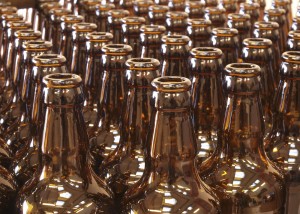
Well, we all have to turn 40 sometime. I appreciate the bottle bill aka “The Beverage Container Act” going first. Love it or hate it,* 2012 marked the bottle bill’s 40th anniversary in Oregon, the first state to adopt such a bill. If you delve into internet research on the bill, there is a lot on the environmental impact of the bill and how it is part of Oregon’s rich history of progressive legislation.
What you don’t see is reference to the bill’s biggest supporters, one of which was the Blitz-Weinhard Brewery (bringing it back to Henry’s). Blitz-Weinhard supported the bill for two very good reasons, first the family running the brewery were/are avid environmentalists and second, this was an effort to keep the big boys: Anheuser Busch, Coors, and Miller out of Oregon. The bill required breweries to send their empties back to the mothership. It’s a long enough way to St. Louis to make a company think about whether breaking into the Oregon market was worth it.
The bottle bill was shepherded through the legislature in 1971 by J. Alford “Hunky” Hampson, a visionary (with an awesome nickname) also responsible for banning billboards on coastal highways and many other environmentally friendly laws. The bill went into effect in October 1972. My favorite part of bottle bill lore is this: at some point during the 1971 legislative session, a representative from the coast, (as it was told to me, Rep MacPherson) stood up and said “Some of you have said this is a bill for Bill [Wessinger]. And why not? No one has done more for this state or its environment.”**
I love this story because it’s about a local brewery, albeit a big one, doing good things for Oregon. The big boys were kept out for a time, but eventually manoevered into Oregon in the late 1970’s.
I have wondered if Oregon breweries realize or are interested in the bottle bill’s beer history and if it adds anything to the beer culture here. Captured by Porches, for example has its own $1 bottle deposit going on. Double Mountain also has a returnables program for half liter bottles touting the unique bottles’ size and strength. And avowing that they can be cleaned and refilled many times. How successful has this been? What’s the environmental impact of refillable bottles vs. “traditional” bottles*** vs. cans?**** perhaps we’ll explore that down the road.
*I’ve taken an informal poll about who returns bottles and who tosses them in with the rest of the curb recycling. I’ve found that if you grew up doing it (as i did) you’re much more likely to haul a heavy sticky bag smelling of alcohol (not in a good way) to the grocery store. Empty bottles have value, not a bad lesson for children and apparently remembered into adulthood.
**Bill Wessinger was then running the Blitz-Weinhard brewery with his brother, Fred Wessinger.
*** Whatever “traditional” means. We’ll include that in the exploration.
**** And shouldn’t we all be toting around growlers like this super sweet one from Base Camp anyway?